Mystery Mueller Case In D.C. Federal Court Continues To Raise Questions
Mystery continues to surround a proceeding that has been making its way through the Federal Courts in Washington, D.C.
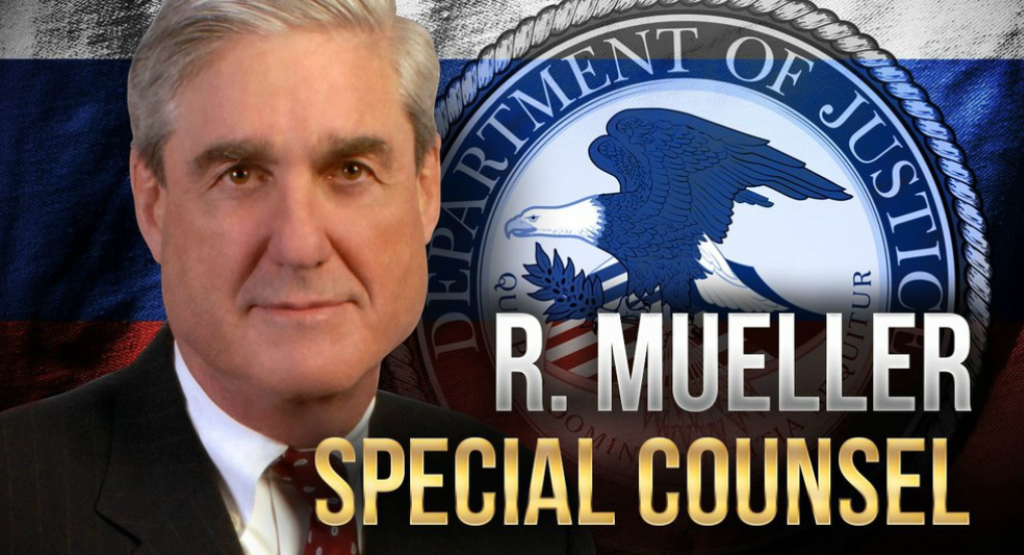
There’s something of a legal mystery that continues to unfold in the Federal Courts in the District of Columbia, and many people are wondering if it’s somehow connected to the Mueller investigation:
For the past several months, journalists, legal experts and close followers of the special counsel’s investigation have been trying to uncover one particular secret about the inquiry: Is the special counsel, Robert S. Mueller III, in a closed-door legal battle? If so, with whom?
In October, Politico reported that Mr. Mueller appeared to be in a secret fight with a witness who was refusing to testify before a grand jury investigating Russia’s efforts to interfere in the 2016 election. A CNN journalist reported seeing two of Mr. Mueller’s top prosecutors enter a courtroom in September to argue against lawyers for an unnamed client before a judge who deals with grand jury matters.
A confidential hearing in the dispute was held on Friday at the federal courthouse in Washington. One floor of the building was closed to protect the identities of the lawyers involved. But that failed to deter roughly a dozen reporters who were spotted rummaging around the courthouse trying to figure out who was involved.
CNN has further details about Friday’s events at the Court of Appeals to the D.C. Circuit that have only added to the mystery:
Fridays at the DC federal courthouse are typically days of high alert for the press corps trying to discern what special counsel Robert Mueller’s next legal action will be.
But this Friday, court officials went to extreme measures to ensure it was as difficult as possible to figure out what Mueller’s team was doing as the US Court of Appeals for the District of Columbia Circuit held a secret and mysterious argument about a grand jury subpoena challenge.
An entire floor of the courthouse was closed to the public and press for more than an hour. During that time, attorneys secretly entered the courthouse to argue before three federal appellate judges over a grand jury subpoena.
The mystery of the subpoena appeal appears to date back to early September, when CNN witnessed several lawyers from Mueller’s office entering a courtroom to argue against an unknown defense team before a trial-level judge who oversees federal grand jury-related cases.
Clearly, a challenge related to Mueller’s grand jury investigation was underway.
Shortly after, that judge, Chief Judge Beryl Howell of the DC District Court, ruled on a case related to a grand jury subpoena, and the losing party attempted to appeal the ruling. The appellate court batted the case back down to Howell, who held a second sealed hearing on October 5. Though CNN was locked out of the courtroom while the arguments took place, the hearing featured the same team from Mueller’s office as before, which included top criminal law appellate lawyer Michael Dreeben.
Mueller’s office declined to comment on the hearings.
That same day Mueller’s team clashed in a sealed courtroom with an unknown opponent, Howell issued another ruling on the same grand jury subpoena challenge she had decided before, sending the losing party back to the appellate court to ask for reconsideration.
Politico a few days later overheard an attorney at the appellate court discussing sealed Mueller court filings — and the mysterious grand jury challenge got its argument date set before a three-judge panel at the DC Circuit Court of Appeals.
Argument day arrived Friday.
Typically, DC Circuit Court arguments run smoothly, one after another until three cases have been argued publicly, starting at 9:30 am in a large, portrait-lined courtroom on the Fifth Floor of the federal courthouse on Constitution Avenue. But after Circuit judges David Tatel, Thomas Griffith and Stephen William — who coincidentally has written two books on Russian history — heard an immigration-related case Friday morning, the courthouse security went into lockdown mode.
Tatel, Griffith and Williams took a brief recess, indicating they’d return to the courtroom shortly.
Then, security officers cleared the appeals courtroom, allowing only about a dozen law clerks working for federal judges to stay behind, including at least one who assists Howell with her cases.
Security guards also cleared the vestibule to the courtroom and checked the coat closet where attorneys coming to listen to arguments stash their belongings. They locked the door leading to the attorneys’ lounge on that floor and shooed the more than 20 reporters prowling the hall away from the elevator bank and told them to vacate the nearby stairwells. At one point, even an elevator wouldn’t open its doors on the fifth floor.
The entire level of the building on which the appeals court is housed was locked down.
I first wrote about this legal mystery back in October in the wake of the aforementioned Politico piece in which a legal analyst when through the developments that could be garnered from a combination of examining the docket and the courthouse rumor circuit. That analyst, Nelson Cunningham, a former federal prosecutor who served under Rudy Giuliani when he was the U.S, Attorney in New York and later served on the Senate Judiciary Committee under Joe Biden and in the Administration of Bill Clinton, suggested that the evidence indicated that both the extraordinary secrecy surrounding the apparent subpoena and the speed with which it has moved through the District Court and the Court of Appeals it seems logical to believe that the party in question must be someone high-profile and that the effort to keep it sealed, which is generally contrary to the openness with which Federal Court proceedings are conducted, is a strong indication that whoever that person is, it is someone high profile. That could be the President, or it could be some other party that the Special Counsel, the Courts, and the attorneys for the target of the subpoena all agree is so high profile that their identity ought to be kept secret.
If President Trump is the subject of this proceeding, then this obviously raises significant legal questions that, ultimately, have to be resolved by the Supreme Court. The central legal question, of course, would be whether or not a sitting President can be subpoenaed to testify before a Federal Grand Jury. This nearly became an issue during the Whitewater investigation when Independent Counsel Ken Starr subpoenaed President Clinton to testify before the Washington, D.C. Grand Jury convened in that case. Ultimately, though, Starr agreed to withdraw the subpoena after Clinton agreed to appear voluntarily. This left the legal question of whether or not a President can be compelled to appear unresolved as a matter of law.
The most favorable precedent from Mueller’s point of view, of course, would be United States v. Nixon, which dealt with the efforts of Watergate Special Prosecutor Leon Jaworski to subpoena the tape recordings that Nixon had made of conversations in the Oval Office that included conversations he had with top aides regarding the Administration’s response to the Watergate break-in. Jaworski had subpoenaed these tapes shortly after John Dean confirmed to the Congressional Committee investigating the Watergate break-in and related matters that there was a recording system in the Oval Office. Initially, the Nixon Administration resisted the subpoena, citing executive privilege among other grounds for withholding the requested tapes. In an expedited ruling, the Supreme Court ruled unanimously, absent the vote of Justice Rehnquist, who had recused himself due to the fact that he had worked in the Nixon Justice Department, that Nixon must turn over the tapes. This, of course, led to the revelation of conversations so incriminating that they made Nixon’s impeachment and removal from office a virtual inevitability. Instead of facing that fate, Nixon resigned.
Given the Nixon precedent, it seems fairly clear to me at least that Trump would be on the losing side of a legal fight over the validity of any potential subpoena. If Oval Office tapes can be subpoenaed then there doesn’t seem to be any reason why the President himself can be subpoenaed to testify as a witness. Of course, if the Russia investigation heads down this path it would like mean months of litigation in the Federal Courts and, ultimately a decision by the Supreme Court. While anything is possible and the makeup of the Court has changed significantly from what it was in 1974 I don’t think that even this court would be willing to ignore the Nixon precedent. For that reason alone, I suspect that eventually, Trump will agree to some kind of interview with Mueller at which his lawyers can be present, but it’s likely to take both sides some time to come to terms on what kind of interview that’s going to be.
In any case, given the speed with which this proceeding, whatever it is, has moved through the court system suggests that the three-judge panel that heard the case will want to issue and expedited opinion in the proceeding. At that point, or at some point shortly thereafter, we could learn what the mystery is all about.

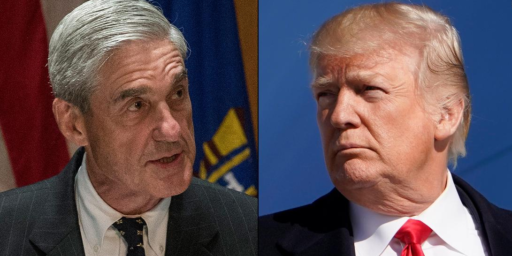
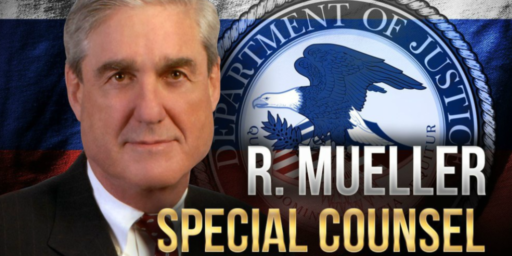

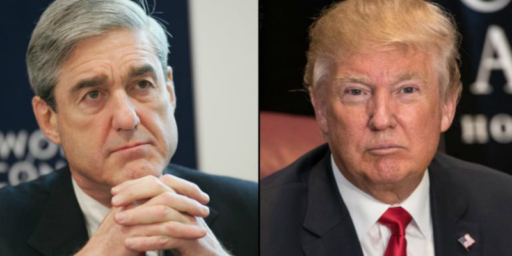
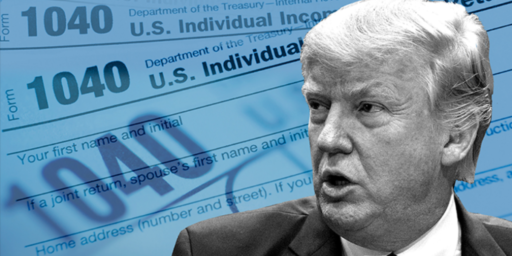
Could be Pence, if not Trump. Third choice: Kelly.
Sessions?
Speculation has it that Don McGahn is attempting to invoke Executive Privilege.
I don’t know enough about procedure to guess if that argument would be successful or not.
@Michael Reynolds: Those two are tempting targets, but would there really be any question that they have to testify? I’m asking, not disagreeing, as IANAL++. If the question is simply executive privilege then I suspect the list of X’s could be pretty wide, as Trump is going to declare that everything is privileged.
Just a guess but I’m thinking it’s a subpoena for Individual-1.
BTW – yesterday was the 245th anniversary of the Boston Tea Party.
Today’s Republicans, if they were alive in 1773, would have been aghast at such patriotism, and would be termed loyalists. Most of them would end up living in Nova Scotia by the end of the war.
OT…Sen. Lamar Alexander (R-TN) retires. Won’t run in 2020.
@MarkedMan:
We know funding of the President’s inauguration ceremony has become an issue, and Mike Pence was in charge of that.
@Stormy Dragon:
Interesting. Like Trump, dumb as a sack of rocks. If he tries to mess with Mueller he will get his ass handed to him. But I think it’s just as likely that he will sing like a bird. If he can successfully convince Mueller that he was just a patsy in all this (and that doesn’t exactly stretch credulity), then if he can help push Trump offstage, he’s President.
@Stormy Dragon: @MarkedMan:
Pence is also the guy who brought in Mike Flynn, IIRC.
When you first wrote about this, Doug, the idea was that it was secret because of sensitivity to legal action in the run up to an election. If this were about a high-profile politician, why would it still be sensitive and secret – real secret? Also, the reporters saw the defense team lawyers in October. Surely, they would recognize members of Trump’s team.
Seems to me that this probably has to do with a sensitive intelligence source. Just my two cents.
@Michael Reynolds: could be…..rather, should be Mueller himself for destroying evidence and obstruction of justice
OK, I have a new one: Bannon. The Russian pro-Trump propaganda was surprisingly on-point for a bunch of furriners, so they had help.
According to CNN, it was a company rather than a person.
Don’t get too excited. There’s minimal information as yet.
Is Cambridge Analytica still in business?
@Kathy:
Apparently a company owned by a foreign country.